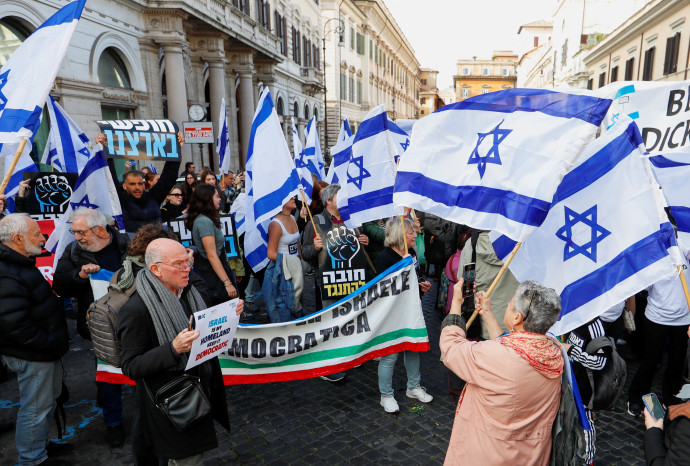It is certainly one of the best times in history for relations between Italy and Israel, as confirmed by PM Netanyahu's recent visit to Rome, followed by Italian Foreign Minister Antonio Tajani's visit to Israel. The meeting between Netanyahu and PM Georgia Meloni went very well. The two, in addition to being the government leaders of two friendly countries close to each other, are also political allies in the conservative field. Italy and Israel have revived economic cooperation, and after 11 years, there will be a new bilateral intergovernmental meeting. Netanyahu has also announced that he intends to export gas to Europe through Italy.
The other good news is that there are no longer any antisemitic or even anti-Zionist political forces in the Italian Parliament. No party present across the floor has taken any hostile position against the Jewish world or Israel in recent years. Instead, most of them are engaged in the fight against antisemitism, both at the legislative level with anti-discrimination legislation and in the defense of Israel's right to exist and defend itself.
Within months of taking office, the new Italian government wanted to send an important signal to the Jewish community and Israel by appointing a National Coordinator to fight against antisemitism.

The bad news, on the other hand, is that last week, the CDEC Foundation's "Annual Report on Antisemitism in Italy in 2022" reported a worsening of the situation.
Antisemitism is still persistent in Italy. Compared to other years, 2022 saw a slight increase in antisemitic activity, with episodes recorded primarily occurring in school settings, notably in conjunction with anniversaries such as Holocaust Remembrance Day, or when the most well-known Jews are at the forefront of certain situations.
There are also Jews, or supposed Jews, who are targeted as individuals, as in the case of Italian Senator Liliana Segre, when, for example, she issues a political statement that is not liked by some groups, as happened when she spoke about migrants by empathizing with them. More recently, the newly appointed Secretary of the Democratic Party, Elly Schlein, has been the target of antisemitic attacks, even being mocked for her pronounced nose. The report also warns about activities on social media where young people may be amused by viral antisemitic jokes about Jews and the Holocaust in particular.
Despite this disappointing news, support for Israel remains strong , as evidenced during Netanyahu's visit. Indeed, all the parties composing the parliamentary majority are currently led by leaders who strongly support Israel and its right to self-defense. From PM Giorgia Meloni to Silvio Berlusconi, many can boast a history of pro-Israel actions and statements. The same is also true for most of Italy's opposition leaders.
During Netanyahu's visit, Minister Salvini reaffirmed his position in favor of recognizing Jerusalem as the capital of Israel and pressed his own government to move the Italian Embassy to the Holy City. Even so, Meloni and the Foreign Ministry, careful not to create friction with European allies and Arab partners, dismissed the matter by declaring that "the issue is not on the agenda."
The goodwill surrounding the trip continued with Italy's Minister of Culture, Gennaro Sangiuliano, who welcomed Netanyahu by promoting cultural cooperation between the two countries, as did Minister for Business, Adolfo Urso, who arranged a bilateral meeting in which the two countries' most prominent companies were present.
Likewise, Deputy Foreign Minister Edmondo Cirielli has spent the past several months working with the ministerial body dealing with international cooperation to highlight the issue of providing financial assistance to Palestinian NGOs. Frequently these organizations are disguised as humanitarian organizations, but individuals connected to terrorist organizations are often hidden behind them. Minister Cirielli directed his staff to strictly monitor the destination of such humanitarian funds to prevent them from being funneled to terrorists.
Lastly, and very important at the regional level, was Assessore Fabrizio Ricca's proposal to the Piedmont Regional Council to petition the Italian government to undertake political and diplomatic action at the United Nations, in the European Union and in any other multilateral forum to initiate concrete efforts to implement the adoption of the IHRA definition of antisemitism, calling on Italy to protect Israel in every forum, and also to recognize Jerusalem as the capital of the Jewish State.
Though we received some bad news about the rise in antisemitism in Italy in 2022, we can be proud of the many pro-Israel and pro-Jewish initiatives the Italian government has undertaken in the past year. It is perhaps one of the few instances where politics turns out to be ahead of the society it represents.
Alessandro Bertoldi is the director of Alleanza per Israele (Alliance for Israel) and of the Milton Friedman Institute, pro-Israel NGOs in Italy.
